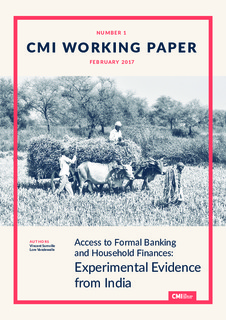| dc.contributor.author | Somville, Vincent | |
| dc.contributor.author | Vandewalle, Lore | |
| dc.date.accessioned | 2018-01-04T08:23:08Z | |
| dc.date.available | 2018-01-04T08:23:08Z | |
| dc.date.issued | 2017-02-01 | |
| dc.identifier | oai:www.cmi.no:6257 | |
| dc.identifier.citation | Bergen: Chr. Michelsen Institute (CMI Working Paper WP 2017:1) 28 p. | |
| dc.identifier.isbn | 978-82-8062-633-2 | |
| dc.identifier.issn | 0804-3639 | |
| dc.identifier.uri | http://hdl.handle.net/11250/2475385 | |
| dc.description.abstract | Access to formal banking is spreading across the world. Obtaining a bank account may transform how people manage their finances, and affect their savings and consumption. We report from a field experiment that randomly provides access to a bank account to a representative sample of villagers in rural India. The treated keep relatively important savings on their account, but reduce their other savings by a similar amount. Their household’s overall savings and expenditures do not change. We identify several barriers that may constraint total savings. | |
| dc.language.iso | eng | |
| dc.publisher | Chr. Michelsen Institute | |
| dc.relation | CMI Working Paper | |
| dc.relation | WP 2017:1 | |
| dc.relation.ispartof | CMI Working Paper | |
| dc.relation.ispartofseries | CMI Working Paper WP 2017:1 | |
| dc.relation.uri | https://www.cmi.no/publications/6257-access-to-formal-banking-and-household-finances | |
| dc.subject | Banking | |
| dc.subject | Bank Accounts | |
| dc.subject | Villages | |
| dc.subject | Rural | |
| dc.subject | Savings | |
| dc.subject | India | |
| dc.title | Access to Formal Banking and Household Finances: Experimental Evidence from India | |
| dc.type | Working paper | |
